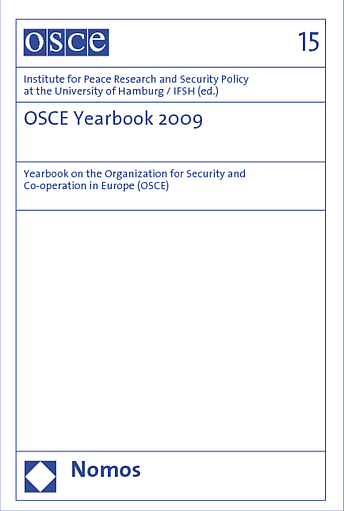englischThe OSCE Yearbook 2009 opens with five contributions written by leading European security experts: Adam Daniel Rotfeld on the possibility that Europe needs a "new security architecture", Egon Bahr and Reinhard Mutz on the future of détente, Pál Dunay and Graeme P. Herd on Russian President Medvedev's initiative for a European Security Treaty, and Andrei Zagorski on this initiative and the resulting Corfu Process. Dennis Sandole also discusses the implications of US foreign policy in the post-Bush era for Europe.
The participating States in focus this year are Ukraine, Lithuania, Belarus, together with past and future Chairmanship-holders Finland and Kazakhstan, while the OSCE conflict prevention and dispute settlement activities discussed include the prospects for conflict resolution in Moldova, the role of the Mission in Kosovo, military aspects of the OSCE Mission to Bosnia and Herzegovina, the OSCE Centre in Astana at ten, and prospects for conflict settlement in Nagorno-Karabakh.
Turning to the three dimensions, contributions include an in-depth consideration of the OSCE's election observation activities by Frank Evers, and an informed legal discussion of de facto regimes and human rights by Hans-Joachim Heintze. Our authors also discuss problems facing human rights defenders, contradictions in international police reform, the OSCE's approach to border security and management, and the legacy of Professor Victor Yves Ghebali, who died this year.
The OSCE Yearbook addresses students and academics, politicians and journalists, and the interested general public.
Den Auftakt des OSCE Yearbook 2009 bildet der Themenschwerpunkt "europäische Sicherheit" mit fünf Beiträgen hochkarätiger internationaler Experten: Adam Daniel Rotfeld fragt nach der Notwendigkeit einer "neuen europäischen Sicherheitsarchitektur"; Egon Bahr und Reinhard Mutz fordern eine neue Entspannungspolitik; Pál Dunay und Graeme P. Herd setzen sich mit der Initiative des russischen Präsidenten Medwedew zum Abschluss eines Vertrags über europäische Sicherheit auseinander und Andrei Zagorski befasst sich mit der Weiterentwicklung der russischen Initiative zum "Korfu-Prozess". Dennis Sandole schließlich stellt die US-amerikanische Außenpolitik gegenüber Europa nach der Ära Bush dar.
Im Mittelpunkt der Länderanalysen stehen in diesem Jahr die OSZE-Teilnehmerstaaten Ukraine, Litauen und Belarus sowie Finnland und Kasachstan als ehemaliger und zukünftiger Inhaber des OSZE-Vorsitzes. Die Arbeit der OSZE im Bereich Konfliktprävention und friedliche Streitbeilegung wird u.a. am Beispiel ihrer Missionen in Albanien, im Kosovo, in Bosnien und Herzegowina und in Moldau dargestellt.
Beiträge zur Wahlbeobachtung, zum Schutz von Menschenrechtsaktivisten, zur Stärkung der Rechtsstaatlichkeit und zu Polizeireformen in Südosteuropa, um nur einige der im Jahrbuch behandelten Themen zu nennen, bilden die vielfältigen Aktivitäten der OSZE in den drei Dimensionen von Sicherheit ab. Es folgt eine Würdigung der Arbeit von Professor Victor-Yves Ghebali.
Im Anhang befinden sich u.a. Daten und Fakten über die 56 OSZE-Teilnehmerstaaten sowie eine detaillierte Literaturübersicht.
Das OSCE Yearbook wendet sich an Studierende und Wissenschaftler ebenso wie an die interessierte Öffentlichkeit, Politiker und Journalisten im In- und Ausland.


